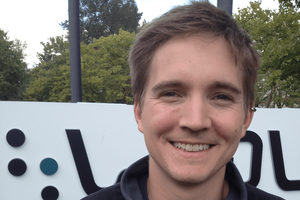[Interview] This Company Brings Quantum Tech Into Protein Design
With several decades of advances in quantum theory and simultaneous progress in a number of software and hardware fields, we are finally entering the era of quantum computers becoming a practically viable thing.
Since the 1990s, huge processing and efficiency-saving promises of quantum computers have stimulated constant research efforts by tech giants – like Google and IBM – and an army of smaller companies, startups, and academic labs. Nowadays, small quantum computers are already a reality. But now a global race unfolds to achieve so-called ‘quantum supremacy’ -- the stage where a quantum computer can perform a task unsolvable by “classical” computers and systems -- giving a disruptive competitive advantage to a company who can do it first. Google advertised it had reached quantum supremacy back in 2019 (see Nature article), but the breakthrough was criticized by IBM arguing that Google’s efficiency claims were misleading.
Quantum computers are superior to a widespread binary ‘1’ or ‘0’ data processing systems in that they make use of quantum bits (‘qubits’) -- where states can be not only ‘1’ and ‘0’, but also in a state of superposition in between those two states. This substantially accelerates calculations making it possible to solve problems many orders of magnitude faster than any legacy system, no matter how advanced.
Importantly, there is a possibility of creating ‘hybrid’ systems that combine quantum computing with ‘classical’ computers -- since all the modern software is run on those -- so quantum computing can kind of integrate into usual workflows. This has created interest in a number of industries, including biopharmaceutical research.
RELATED: 18 Startups Using Quantum Theory To Accelerate Drug Discovery
One notable application example in this space is using quantum annealing to solve the protein sequence design problem, a vital aspect of rational drug design -- what a team at Menten AI is doing in collaboration with D-Wave Supercomputer (here is a case study showing how they have used D-Wave's unique quantum-classical hybrid solvers (available in the cloud) and other quantum providers. Menten AI is a San Francisco-based Seed-stage biotech company, founded in 2018 by Dr. Hans Melo, Dr. Tamas Garbe, and Dr. Vikram Mulligan. The company is focused on creating the next generation of protein-based drugs and enzymes powered by machine learning and quantum computing.
Dr. Hans Melo, serving also as CEO of Menten AI, shared with me several insights about the field and his company:
Andrii: Can you describe Menten AI in several sentences?
 Hans: We design protein-based drugs using machine learning and quantum computing. We focus on designing stable peptides. We partner with biotech and pharmaceutical companies to co-develop potential drugs. We also have our own internal programs. We are three co-founders. Vikram Mulligan, PhD, a protein design expert and core developer of the Rosetta Software, Tamas Gorbe, PhD, a protein engineering expert, and myself, Hans Melo, PhD, with a background in Physics and Machine Learning.
Hans: We design protein-based drugs using machine learning and quantum computing. We focus on designing stable peptides. We partner with biotech and pharmaceutical companies to co-develop potential drugs. We also have our own internal programs. We are three co-founders. Vikram Mulligan, PhD, a protein design expert and core developer of the Rosetta Software, Tamas Gorbe, PhD, a protein engineering expert, and myself, Hans Melo, PhD, with a background in Physics and Machine Learning.
Andrii: Your website states that you apply machine learning and quantum computing for designing new protein-based molecules. Can you outline the process?
Hans: Our platform combines machine deep neural networks and quantum computing for protein design. Our hybrid classical-quantum workflow applies machine learning to decrease the search space as proteins as designed, and hybrid classical-quantum optimization to perform the final optimization step of the design process.
Andrii: While machine learning is familiar to many drug hunters, quantum computing is a relatively new thing in the drug discovery community. Can you explain how it is different from traditional computing methods and what kind of benefit it offers?
Hans: Traditional drug discovery involves trying hundreds of thousands of molecules against a target in the wetlab. Most machine learning methods in this space aim to move this screening process to the computer. Our approach is completely different, rather than searching for a molecule among billions, we aim to design it from scratch.
This involves a complex optimization process where quantum computing may be useful. Simply put, we use machine learning for what it’s good for, learning from data, and use quantum computing for optimization problems where classical machine learning falls short.
Andrii: How do you get access to quantum computing resources?
Hans: We have a number of quantum hardware partners who allow us to access their systems on the cloud. It is relatively straightforward, similar to accessing Amazon’s AWS.
Andrii: What is the current status of your research -- any results so far?
Hans: We’ve come a long way in a short length of time. Since our initial work translating the protein design problem to the quantum realm, we’ve created and evolved the platform to create stable real world proteins in the wetlab. Our machine learning work has also taken a huge jump. We are now seeing very promising results from our designed peptides for a number of drug targets, and will publish the results in the coming months.
Andrii: What are your company’s major plans for 2021? How do you define the next big milestone for the Menten AI’ team?
Hans: 2021 will be dominated by evolving our platform through quick iterations with the wetlab results. Advancing a number of programs both internal and via partnerships in the drug development path towards IND will be our next big milestone.
Topics: AI & Digital

